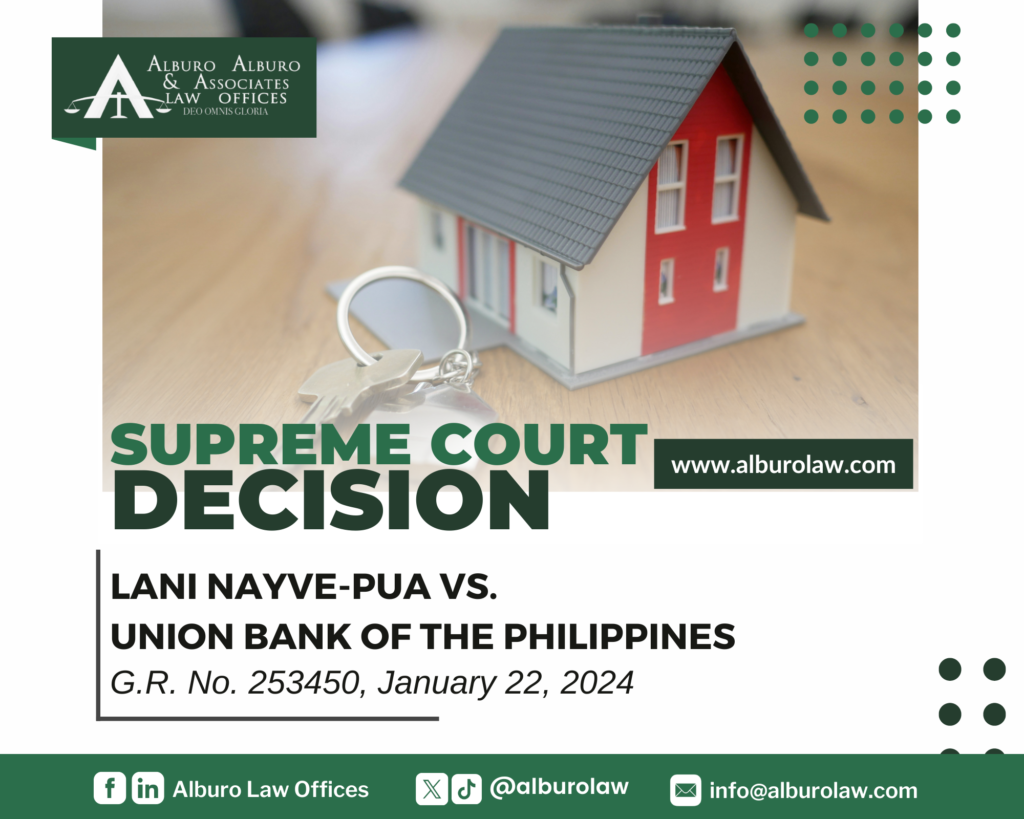(The case of Lani Nayve-Pua Vs. Union Bank of the Philippines, G.R. No. 253450, January 22, 2024)

Photo from Unsplash | Tierra Mallorca
The following post does not create a lawyer-client relationship between Alburo Alburo and Associates Law Offices (or any of its lawyers) and the reader. It is still best for you to engage the services of a lawyer or you may directly contact and consult Alburo Alburo and Associates Law Offices to address your specific legal concerns, if there is any.
Also, the matters contained in the following were written in accordance with the law, rules, and jurisprudence prevailing at the time of writing and posting, and do not include any future developments on the subject matter under discussion.
AT A GLANCE:
According to the Civil Code, property acquired before marriage remains the exclusive property of the individual, unless proven otherwise. The presumption of conjugal ownership only applies to property acquired during the marriage. Since Lani admitted the property was bought before the marriage and was purchased with Stephen’s personal funds, she could not claim it as conjugal.
Lani and Stephen Pua began living together in December 1975 and bought a property in March 1978, which was registered solely in Stephen’s name. They married in July 1983. In January 2004, Lani discovered the property had been mortgaged and foreclosed by Union Bank, with Spouses Uy using it as collateral. Lani claimed forgery of her signature on the mortgage documents and denied consent to the mortgage.
Union Bank argued that the property was Stephen’s exclusive property, as it was acquired before their marriage and was registered in his name as “single.” They claimed that under the Civil Code, their property regime was a conjugal partnership of gains, which does not retroactively affect properties acquired before marriage. Thus, Lani had no legal claim against Union Bank.
The issue in this case is whether the property in question is conjugal.
The Court ruled that the property is not conjugal.
The property was acquired in 1978, before Lani and Stephen’s marriage in 1983, and was registered solely in Stephen’s name. According to the Civil Code, property acquired before marriage remains the exclusive property of the individual, unless proven otherwise. The presumption of conjugal ownership only applies to property acquired during the marriage. Since Lani admitted the property was bought before the marriage and was purchased with Stephen’s personal funds, she could not claim it as conjugal. Lani had to prove either that the property was acquired during the marriage or that it was built using conjugal funds, neither of which she established. Thus, the property remains Stephen’s separate property.
Source:
Lani Nayve-Pua Vs. Union Bank of the Philippines, G.R. No. 253450, January 22, 2024
Alburo Alburo and Associates Law Offices specializes in business law and labor law consulting. For inquiries regarding taxation and taxpayer’s remedies, you may reach us at info@alburolaw.com, or dial us at (02)7745-4391/0917-5772207.
All rights reserved.

